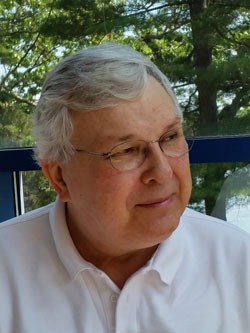
With the Presidential primaries and caucuses in full swing, candidates are sure to mention America’s crumbling transportation infrastructure. Or at least they should.
The American Society of Civil Engineers is reporting a C+ grade for the nation’s bridges and a D for roads, making a new primer on the nation’s transportation infrastructure something that could be considered essential reading for a well-informed electorate.
For his latest book, “The Road Taken,” prolific Duke University author and engineering professor Henry Petroski sought to explore the history, technology and politics involved in everything from constructing the largest bridge span to filling the smallest pothole. Debuting today, the book gives an in-depth look at the evolution and devolution of the U.S. infrastructure through the lens of roads and bridges.
By detailing success stories and failed case studies of how public works are designed, funded, approved and built, Petroski paints a picture leading to one obvious conclusion about the state of modern infrastructure: it’s complicated but comprehensible.
“Our infrastructure depends on so many factors,” said Petroski, whose newest work is his 19th published book. “It depends on the goodwill of the people involved, which includes a long list of professionals from engineers to politicians. And even when they’re all in it for the right reasons, simple decisions like whether the centerline on highways should be white or yellow still take years to agree on.”
The 321-page book begins by exploring the history of how modern roads and bridges evolved into their current state, both through the technology of their composition and the decisions made about their markings and signage. It then moves into several examples of large-scale projects, such as the Tappan Zee Bridge in New York and the San Francisco--Oakland Bay Bridge in California, to explore the politics and funding involved.
There are no shortages of corruption, scandal and poor decision-making. While the book ends with an exciting look at some of the technology that promises to revolutionize transportation in the coming decades, the general outlook for the immediate future is not rosy.
“We’re not all in it together for the same end,” Petroski said. “There’s a lot of selfishness in the process, and I give several examples in the book. I’d like people to realize that when we’re talking about fixing roads or building new bridges, there are all of these factors that need to be taken into account.” The examples include everything from vastly inflated prices paid to acquire land for a new parkway to improperly granted multimillion-dollar paving contracts.
Henry Petroski has taught at Duke as a professor of civil and environmental engineering for more than three decades. He was elected a member of the National Academy of Engineering in 1997 “for books, articles, and lectures on engineering and the profession that have reached and influenced a wide range of audiences.” His critically acclaimed books have earned him the reputation as “America’s poet laureate of technology,” and he also writes regular columns for ASEE Prism magazine and American Scientist.
“The Road Taken,” Bloomsbury, 336 pages, $28.00.